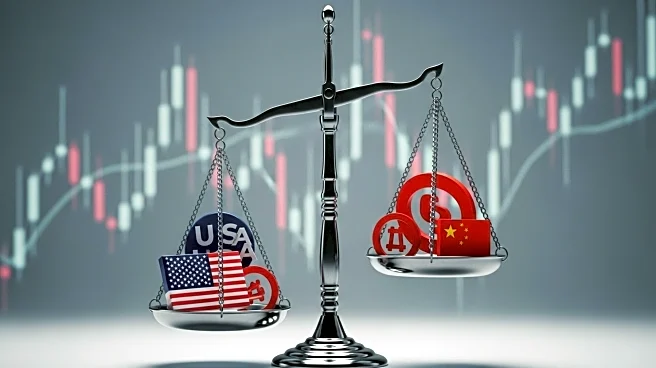What's Happening?
Jay Woods, the chief market strategist for Freedom Capital Markets, has identified US-China trade uncertainty as a significant factor contributing to market volatility. This assessment comes amid recent posts on Truth Social by President Trump, which have raised questions about the future of trade relations between the two countries. Additionally, upcoming earnings reports from banks and transportation sectors are expected to influence market dynamics further. The interplay between geopolitical tensions and economic indicators is creating a complex environment for investors, as they navigate potential risks and opportunities.
Why It's Important?
The uncertainty surrounding US-China trade relations has broad implications for the U.S. economy and global markets. Trade tensions can lead to disruptions in supply chains, affecting industries reliant on international commerce. Investors are closely monitoring these developments, as they can impact stock prices and market stability. The banking and transportation sectors, which are integral to economic growth, may experience fluctuations based on trade policies and earnings reports. Understanding these dynamics is crucial for stakeholders aiming to make informed decisions in a volatile market environment.
What's Next?
Market participants are expected to keep a close watch on any further communications from President Trump regarding trade policies, as these could signal shifts in diplomatic strategies. Additionally, the release of earnings reports from key sectors will provide insights into how companies are adapting to current economic conditions. Analysts and investors will likely adjust their strategies based on these outcomes, seeking to mitigate risks while capitalizing on potential opportunities. The ongoing dialogue between the U.S. and China remains a critical factor in shaping future market trends.
Beyond the Headlines
The broader implications of US-China trade uncertainty extend beyond immediate market reactions. Long-term shifts in trade policies could influence global economic structures, prompting countries to reassess their trade alliances and strategies. Ethical considerations regarding trade practices and their impact on labor markets may also come to the forefront, as stakeholders evaluate the social and economic consequences of geopolitical decisions.










